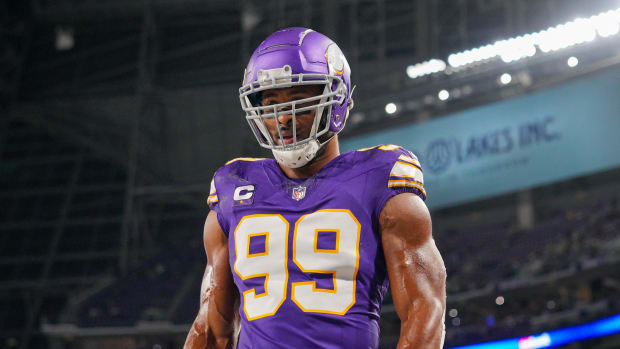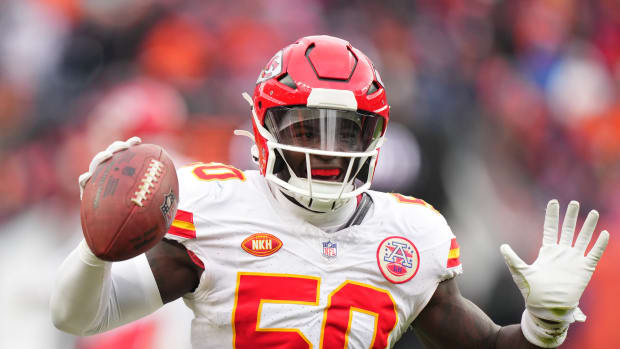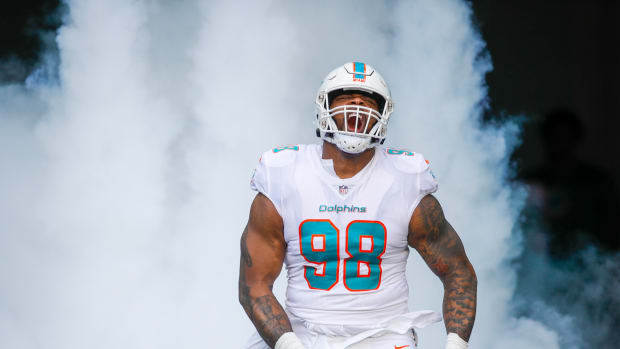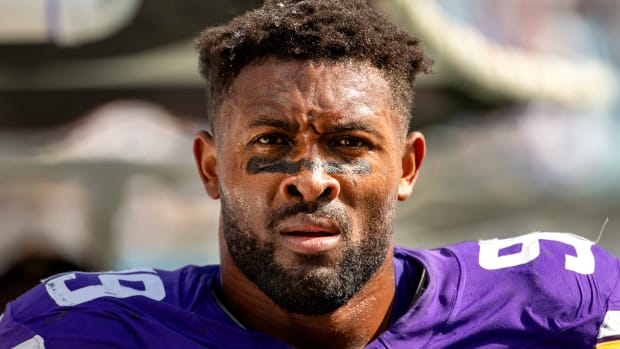NFC Championship instant analysis: Falcons dominate Packers, advance to Super Bowl LI
That the Falcons took down the Packers for the NFC title was no upset. That Atlanta absolutely steamrolled Green Bay, from kickoff to finish, was a development few (if any) saw coming.
The Falcons are headed to Super Bowl LI after a thoroughly dominant 44–21 win Sunday. Five thoughts on their victory:
1. The full Falcons’ arsenal was on display Sunday: Julio Jones is Batman playing wide receiver. We know this. He has been carving up defenses for six seasons now. Asking anyone to cover him one-on-one, as the Packers did often with Ladarius Gunter, is a recipe for disaster. Gunter will be waking up in cold sweats all off-season thinking about the clinic Jones put on Sunday (nine catches, 180 yards, two TDs).
What has made this Falcons’ offense hum all season, though, is how multi-faceted it is. Want to man-up on Jones? Ryan will attack that matchup—even last week vs. Seattle and Richard Sherman, Jones caught six passes and scored.
OK, so roll more coverage over the top of Jones, right? Worth a shot, except that seven other Falcons caught passes Sunday. The arrivals of Mohamed Sanu, Taylor Gabriel and Tevin Coleman this off-season gave Atlanta what it needed to fully unleash QB Matt Ryan’s capabilities within the offense.
Add in the Coleman/Devonta Freeman run game (plus the occasional Ryan run, like his TD Sunday), and there’s no obvious blueprint available for how to stop the Falcons. Not with Ryan playing the way he is. He again Sunday proved why he is a near-lock to win the MVP.
The Packers certainly didn’t have anything close to the game plan or the bodies needed to make it happen. Even with Quentin Rollins returning to the lineup Sunday, they were overmatched sideline to sideline and did themselves no favors by failing to pressure Ryan on a consistent basis.
2. Packers’ defense missed its few opportunities: All that said, the Packers had a handful of chances to flip momentum, however briefly.
In the second quarter, with the Falcons up 17-0, a snap that appeared to be aimed at a motioning Gabriel deflected off the Atlanta wide receiver for a fumble. Green Bay linebacker Jake Ryan dove, unimpeded, onto the loose ball, only to have it slip out of his hands and right back to Gabriel.
On Atlanta’s next possession, Ryan attempted two passes that could have—and possibly should have—been intercepted. The first was a highly ill-advised deep ball to a covered Aldrick Robinson that DB Marwin Evans simply mistimed. The second, from the Green Bay 5, ricocheted off the hands of both HaHa Clinton-Dix and Gunter. Atlanta scored on the next play.
Add in a fumble by Packers FB Aaron Ripkowski in the red zone, and the visitors just didn’t take advantage of moment that could have kept them within striking distance.
Atlanta Rising: The Falcons and their fan base embark on a new era
3. On Atlanta’s defensive improvement: Up until about the Falcons’ Week 11 bye, the defense led by coach Dan Quinn and coordinator Richard Smith looked to be a potential Achilles’ heel for the NFC South champs. It still may be, at least in comparison to the offense, but the D’s steps forward the past two months have been obvious.
Linebacker Deion Jones is front and center in those changes. He has developed from a solid contributor early in his rookie season to an irreplaceable force. Jones helped set the tone early Sunday with a well-timed, third-down blitz that forced Aaron Rodgers into an incompletion. Oh, and add this to the list of Green Bay’s missed opportunities: Mason Crosby pushed the ensuing field goal wide.
Slot cornerback Brian Poole wound up handling an increased role this year, too, after Desmond Trufant fell to injury. Poole leveled Rodgers twice with blitzes, both times coming clean off Rodgers’ blindside. Green Bay’s superstar QB wound up throwing for 287 yards and three touchdowns, but it wasn’t until the Falcons already led 31-0 that he found any rhythm at all.
The Falcons ratcheted up Rodgers’s discomfort level by coming after him early, a stark contrast to the passive approaches used by recent Green Bay foes. Quinn and Smith would not have been able to go that route without having confidence in their back seven.
4. What’s next for Kyle Shanahan?: The Super Bowl in two weeks, for starters. But before the Falcons arrive in Houston, Shanahan could close a deal to become the next head coach ... somewhere. Odds are, San Francisco is the landing spot, if he leaves—reports have the 49ers waiting on him.
However, it’s not totally out of the question that a franchise like Indianapolis, which just fired its GM and has an embattled head coach, could change its mind and get in the mix after witnessing Shanahan’s playoff work.
The first drive Sunday alone was evidence of Shanahan’s mastery. The Falcons marched 80 yards in 13 plays, with six different Falcons (aside from Ryan) touching the ball. The niftiest call: a play-action pass to fullback Patrick DiMarco, who slipped out of the backfield uncovered for 31 yards. That play set up a Ryan-to-Sanu TD.
Does Shanahan want to take his shot in San Francisco? Or, does he want to return to a still-loaded Atlanta offense in 2017 and see if a different (read: better) offer comes along?
5. Soul-searching off-season for the Packers: Injuries demolished the Packers this season, right on through Sunday. Kentrell Brice, Jake Ryan, Ty Montgomery and impending free agent guard T.J. Lang were among those who exited early; several Green Bay players, counting the flak-jacketed Jordy Nelson, were in doubt ahead of this game.
All in all, despite Sunday’s result and a 4-6 start, this was a successful year—an NFC North title, a trip to the conference championship. Most franchises would kill for those accomplishments.
And yet, there should be the disappointment that comes with defeat. Since the Super Bowl win at the end of the 2010 season, the Packers now have gone six years without a trip back to the big game, right in the heart of Rodgers’s prime. They can’t seem to fix their defensive issues and the offense would have been a complete train wreck in 2016 with even an average QB at the helm.
Coach Mike McCarthy and GM Ted Thompson likely aren’t going anywhere, but this has to be a productive off-season. Rodgers will turn 34 next December. While he should have a good five or six years left, that window is slowly starting to close. Every season in the Rodgers era that goes by without a Super Bowl trip is a bit of a waste.




































